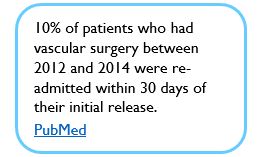USE CASE: Reducing Readmission for Vascular Surgery Patients
 The University of Colorado Hospital (UCHealth) is the only academic medical center focused on specialized care in Colorado. Providers practicing at UCHealth are Specialists and Surgeons, offering care to the residents of Colorado and several other neighboring states. UCHealth also provides graduate medical education through affiliated health professional schools. As an academic institution, UCHealth has a strong dedication to all forms of health research in order to better serve the community and improve outcomes for their patients.
The University of Colorado Hospital (UCHealth) is the only academic medical center focused on specialized care in Colorado. Providers practicing at UCHealth are Specialists and Surgeons, offering care to the residents of Colorado and several other neighboring states. UCHealth also provides graduate medical education through affiliated health professional schools. As an academic institution, UCHealth has a strong dedication to all forms of health research in order to better serve the community and improve outcomes for their patients.
Project Summary: Vascular surgery patients have higher rates of readmission compared to other surgical patients, and frequently require continued outpatient care following hospital discharge. This  project is aimed at identifying patients receiving certain common vascular procedures and determining rates of readmission, costs of care, risk factors, and outpatient care received. With these data, researchers are analyzing readmitted vs. non-readmitted patients to compare costs, risk factors, and outcomes. Additionally, they seek to determine if the level of outpatient care influences readmission rates. Ultimately, UCHealth plans to use these data towards designing an interventional study where more frequent outpatient care may prevent future readmission in high-risk patients. Moreover, they hope to apply this study design to surgical oncology patients, who also undergo major operations with significant rates of readmission and outpatient care.
project is aimed at identifying patients receiving certain common vascular procedures and determining rates of readmission, costs of care, risk factors, and outpatient care received. With these data, researchers are analyzing readmitted vs. non-readmitted patients to compare costs, risk factors, and outcomes. Additionally, they seek to determine if the level of outpatient care influences readmission rates. Ultimately, UCHealth plans to use these data towards designing an interventional study where more frequent outpatient care may prevent future readmission in high-risk patients. Moreover, they hope to apply this study design to surgical oncology patients, who also undergo major operations with significant rates of readmission and outpatient care.
Benefit to Colorado: This study improves researchers’ understanding of the reasons for patient readmission following vascular and oncologic surgical procedures. By identifying these risk factors, providers can improve patient outcomes by intervening early to prevent readmission. This can also lead to a reduction in health care costs, as readmissions and emergency room visits are associated with significant financial burden on the health care system. Additionally, specialized care in Colorado is often limited geographically such that many patients utilize outside of the original health system for their continued care postoperatively. This study could help researchers understand the impact patient migration and how to better align access and coordination to benefit patients.